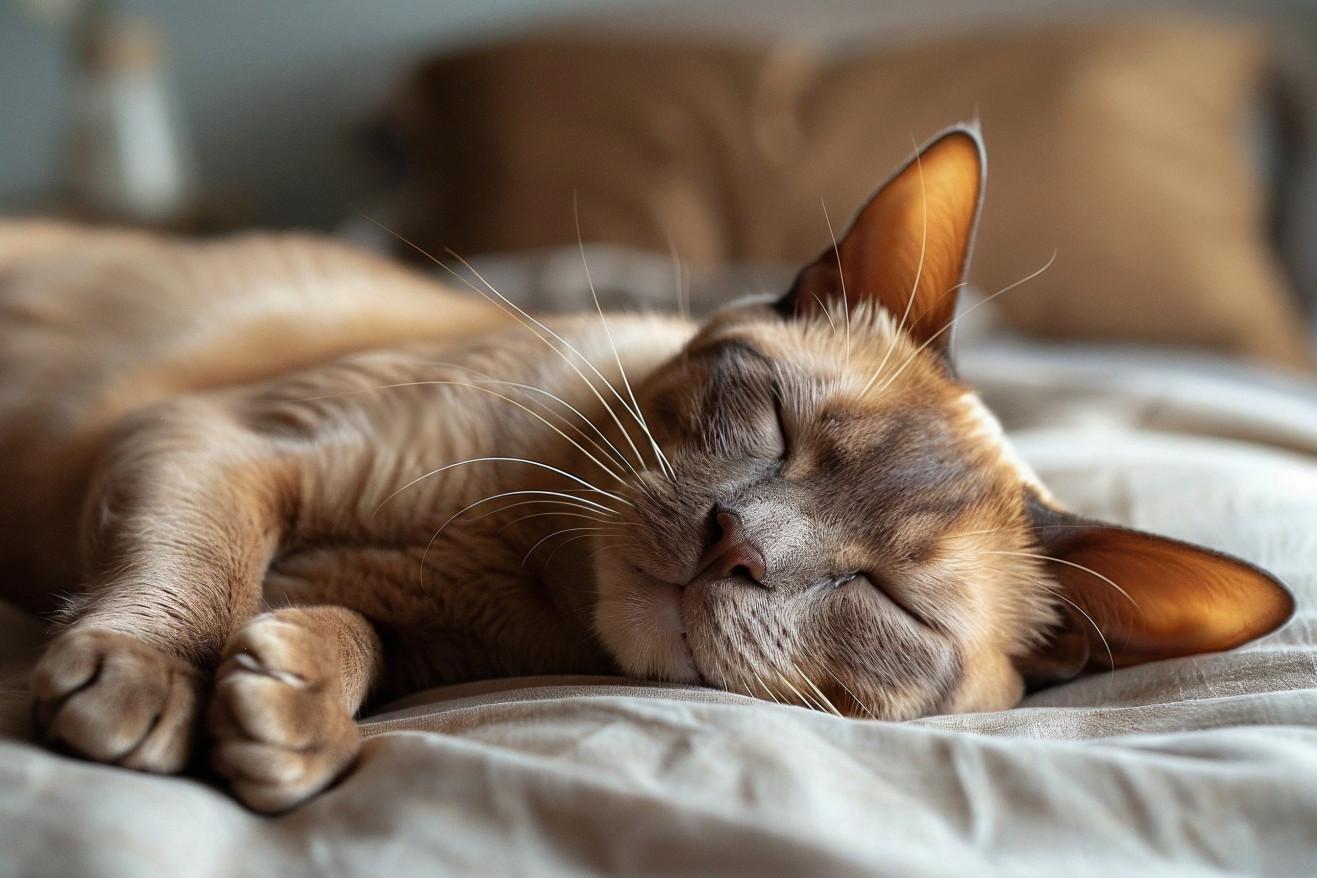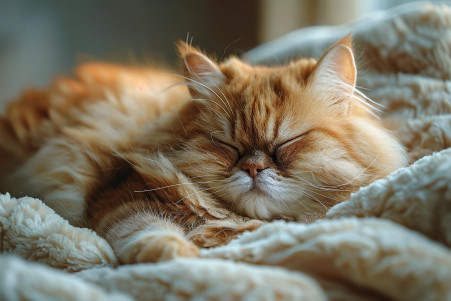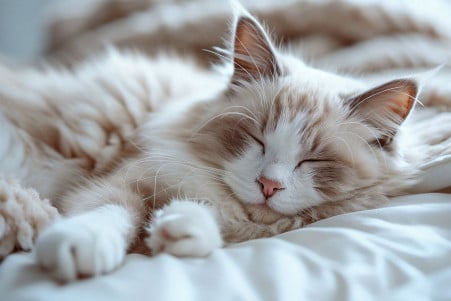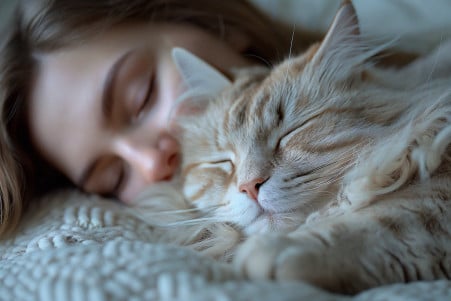Why Do Cats Snore? Causes, Concerns and Solutions
29 May 2024 • Updated 28 May 2024

Have you ever noticed your cat snoring or making other strange noises while they sleep? Believe it or not, cats can and do snore, and it's often caused by the same things that lead to snoring in humans, such as the relaxation of throat muscles or nasal congestion. That said, while snoring is usually nothing to worry about, especially if it's not happening all the time, if your cat snores loudly and often, it could be a sign of an underlying health issue, including allergies, obesity, or respiratory problems. In addition, snoring is more common in brachycephalic, or flat-faced, cat breeds.
In this article, we'll take a look at what veterinary science has to say about why cats snore, including the most common reasons cats snore, what snoring can mean for your cat's health, and what you can do to help your cat if their snoring is keeping them (or you) up at night. By learning more about this interesting sleep behavior, you'll also learn how to tell the difference between harmless snoring and snoring that could be a sign of a health issue, and how to make sure your cat gets the best sleep possible. Let's take a closer look at the most recent research on snoring in our feline friends.
Can cats snore?
When Cat Snoring May Be a Concern
Although some cats may snore more than others, sudden or persistent loud snoring may be a sign of an underlying health issue. Owners should be on the lookout for other symptoms such as labored breathing, a fever, a lack of appetite, or any other changes in behavior that may be happening at the same time as the snoring. According to veterinary experts, causes of snoring that may be a concern include respiratory infections, allergies, sleep apnea, and obstructions such as polyps or tumors.
If your cat is experiencing severe respiratory distress or having trouble breathing, you should seek veterinary care immediately. Signs of severe respiratory distress include blue mucous membranes, which indicate a lack of oxygen, and mean that your cat is having trouble breathing. To determine the cause of your cat’s snoring, a vet may use imaging tests such as X-rays in addition to a physical examination to look for any abnormalities in the airways, trachea, and lungs. Treatment will depend on the cause of the snoring. While snoring is typically nothing to worry about, it’s a good idea to keep an eye on your cat’s snoring habits to ensure that any potential health issues are caught early.
Breed Predispositions: Cats More Prone to Snoring
There are certain cat breeds that are more prone to snoring due to their facial structure and physical makeup. According to Crown Veterinary Specialists, brachycephalic breeds like Persians, British Shorthairs, and Exotic Shorthairs have flat faces and narrow nasal passages, which makes them more likely to snore and to snore more loudly than other breeds.
These brachycephalic breeds, as Meowden points out, have a flat skull, flat face, squashed nose, and narrow nasal passages, all of which contribute to snoring. People who own these breeds should be aware of the increased risk and keep an eye on their cat’s snoring.
Even though these breeds are more prone to snoring, PetGuard says that if a cat is snoring excessively or in a way that’s concerning, it should be checked out by a vet because it could be a sign of an underlying health problem. Still, knowing which breeds are more likely to snore can help cat owners know when their pet’s snoring may be a cause for concern.
How to Prevent and Manage Cat Snoring
Preventing and managing cat snoring involves treating the underlying causes of the condition. This means that if your cat is snoring due to obesity, allergies, or respiratory issues, you'll need to work with your vet to address these problems. iHeartCats explains that in the case of obesity, losing weight through a combination of a healthy diet and regular exercise can help alleviate snoring in cats. In addition, using a humidifier or changing the position your cat sleeps in may help some cats. If your cat's snoring is keeping you up at night, PrettyLitter recommends that you consider sleeping in separate rooms.
In more extreme cases, PetLovers Centre says that your vet may recommend surgical procedures to open up nasal passages or remove obstructions like tumors or polyps. Although these procedures do carry some risks, they can also lead to a significant improvement in your cat's breathing and snoring. By treating the underlying causes of snoring with a combination of at-home and professional care, cat owners can help their pets get a good night's sleep.
Snoring Patterns: Kittens vs. Adult Cats
Kittens are generally less prone to snoring compared to adult cats, according to Animal Friends. However, the study on acoustic phonetics of cat snoring found that older cats are more likely to snore due to age-related health conditions like arthritis or infections. The study authors note that snoring in kittens may indicate an underlying issue and should be monitored closely.
As cats age, their snoring patterns and frequencies may change due to alterations in the larynx and vocal cords, the study found. Animal Friends advises that seeking veterinary advice is recommended if a kitten or young cat starts snoring excessively, as it could signal a problem requiring treatment. Understanding the differences in snoring between kittens and adults can help owners recognize when to be concerned about their cat's sleeping sounds.
Conclusion: How to Make Sure Your Cat Gets a Good Night's Sleep
Snoring is a common occurrence in cats, especially during deep sleep. The Spruce Pets explains that snoring is generated by the vibration of loose tissue in the upper airway as the cat breathes.
While occasional snoring is usually harmless, PetMD notes that persistent or concerning snoring should be evaluated by a vet. Sudden onset of snoring, distressed breathing, nasal discharge, or other symptoms may indicate an underlying medical condition requiring treatment.
Addressing causes like obesity, respiratory issues, or anatomical factors can help reduce disruptive snoring. SHEBA UK advises maintaining a healthy weight, preventing infections, and addressing breed-related anatomical problems to alleviate snoring.
Owners should monitor their cat's snoring patterns and be aware of breed predispositions. With proper care and attention, both cats and their owners can enjoy a peaceful night's sleep.


